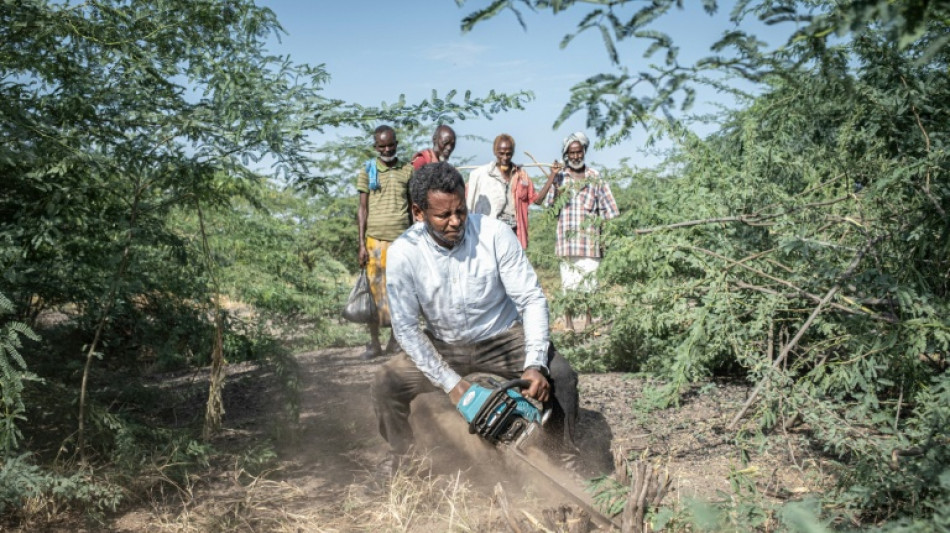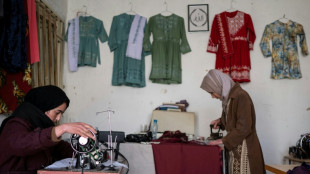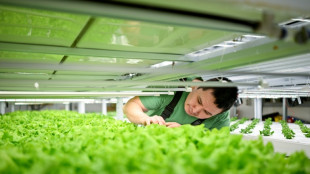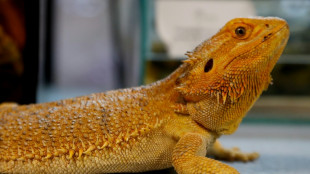
-
 Indonesia coal plant closure U-turn sows energy transition doubts
Indonesia coal plant closure U-turn sows energy transition doubts
-
Ukraine war talks to resume in Geneva with no sign of progress

-
 Afghan woman's boutique brightens Bamiyan
Afghan woman's boutique brightens Bamiyan
-
Zuckerberg to testify in landmark social media addiction trial

-
 US towns resist Trump plans to jail immigrants in warehouses
US towns resist Trump plans to jail immigrants in warehouses
-
Ten skiers missing in California avalanche

-
 Guatemalan security forces deploy to gang-plagued capital
Guatemalan security forces deploy to gang-plagued capital
-
US to discuss base with Mauritius as UK returns islands

-
 Mexico prepares for possible drone threats during the World Cup
Mexico prepares for possible drone threats during the World Cup
-
Bowlers, selectors under fire after Australia's T20 World Cup exit

-
 Racism allegations overshadow Real Madrid victory as PSG win in Champions League
Racism allegations overshadow Real Madrid victory as PSG win in Champions League
-
Japan's Nakai shines on ice as Frostad soars to Olympic big air gold

-
 Japanese teen Nakai leads Sakamoto after Olympic women's short programme
Japanese teen Nakai leads Sakamoto after Olympic women's short programme
-
Sweden to face USA in Olympic men's ice hockey quarter-finals

-
 Alexander-Arnold hits out at 'disgusting' alleged Vinicius racism
Alexander-Arnold hits out at 'disgusting' alleged Vinicius racism
-
Bird flu ravaging Antarctic wildlife, scientist warns

-
 Nakai leads Sakamoto in Olympics after women's short programme
Nakai leads Sakamoto in Olympics after women's short programme
-
Guirassy guides Dortmund past Atalanta in Champions League play-offs

-
 Vinicius stunner helps Real Madrid edge Benfica in play-off marred by alleged racism
Vinicius stunner helps Real Madrid edge Benfica in play-off marred by alleged racism
-
Doue inspires PSG to comeback Champions League win in Monaco

-
 'Climate cult' hurts Europe's economy, US energy secretary tells AFP
'Climate cult' hurts Europe's economy, US energy secretary tells AFP
-
Peru's presidential musical chairs

-
 France arrests nine over far-right activist's killing
France arrests nine over far-right activist's killing
-
France arrests seven over far-right activist's killing

-
 Frostad dethrones Ruud in Olympic freeski big air thriller
Frostad dethrones Ruud in Olympic freeski big air thriller
-
Galatasaray thrash 10-man Juve in Champions League play-off 1st leg

-
 Woods return timeline uncertain, but won't rule out Masters
Woods return timeline uncertain, but won't rule out Masters
-
Dozens of film figures condemn Berlin Film Festival 'silence' on Gaza

-
 Iran, Ukraine talks spark diplomatic merry-go-round in Geneva
Iran, Ukraine talks spark diplomatic merry-go-round in Geneva
-
Canada launches huge defence plan to curb reliance on US

-
 US says will match alleged Chinese low-yield nuclear tests
US says will match alleged Chinese low-yield nuclear tests
-
Alcaraz battles into second round of Qatar Open

-
 Russians, Belarusians to compete under own flags at Paralympics: IPC tells AFP
Russians, Belarusians to compete under own flags at Paralympics: IPC tells AFP
-
Bayer proposes class settlement for weedkiller cancer claims

-
 Gauff, Rybakina cruise into Dubai last 16
Gauff, Rybakina cruise into Dubai last 16
-
Greenland entrepreneur gambles on leafy greens

-
 Father of US school shooter goes on trial on murder charges
Father of US school shooter goes on trial on murder charges
-
Iran, US agree on 'guiding principles' for deal at Geneva talks: Iran FM

-
 Warner Bros. gives Paramount one week to outbid Netflix
Warner Bros. gives Paramount one week to outbid Netflix
-
Russians, Belarusians allowed to compete under own flags at 2026 Paralympics: IPC tells AFP

-
 Ukrainian wife battles blackouts to keep terminally ill husband alive
Ukrainian wife battles blackouts to keep terminally ill husband alive
-
Pollock handed first England start for Ireland visit

-
 Oil prices fall back as 'hopeful' Tehran responds to Trump
Oil prices fall back as 'hopeful' Tehran responds to Trump
-
Arteta welcomes Madueke and Saka's competition for places

-
 France and India hail growing ties as Modi hosts Macron
France and India hail growing ties as Modi hosts Macron
-
Warner Bros. says reopening talks with Paramount on its buyout offer

-
 Slalom showdown Shiffrin's last chance for Milan-Cortina medal
Slalom showdown Shiffrin's last chance for Milan-Cortina medal
-
Protesters march in Kosovo, as ex-president's war crimes trial nears end

-
 No pressure on India opener Abhishek after two ducks, says coach
No pressure on India opener Abhishek after two ducks, says coach
-
Sakamoto eyes figure skating gold in Olympic farewell


Ethiopia's invasive prosopis tree chokes livelihoods and land
Once hailed as a solution to Ethiopia's creeping desertification, a foreign tree is now spreading uncontrollably across the east African nation, threatening fragile ecosystems and the very survival of local communities.
Native to Latin America, the prosopis shrub-like tree was first planted in Ethiopia's northeastern Afar region in the 1970s.
It has become a nightmare for locals like livestock farmer Khadija Humed.
"Because of this plant, we have become poor," she told AFP.
Heat-resistant and fast-growing, prosopis initially promised to curb soil erosion and provide shade to cool the local micro-climate in Afar's arid lowlands.
But today it has overrun the region's vast plains -- its thorny, drooping branches rising up to 10 metres (33 feet) high.
Each tree can draw up to seven litres of water a day through its deep roots, drying out the soil and crippling agriculture.
The prosopis also harms livestock, local pastoralists say.
"The plant has turned against us," Hailu Shiferaw, a researcher at the Ethiopian Water and Land Resources Centre, told AFP.
"No one could have foreseen its harmful effects."
- 'Everything has changed' -
In Khadija's village, some 200 kilometres (124 miles) northeast of the capital Addis Ababa, she said the tree's pods make their cows sick, blocking their mouths and stomachs and killing some -- losses that have driven the community into deep poverty.
"I personally have 10 cows and more than 20 goats and sheep. But before prosopis, people here used to have 50 to 100 cattle shesaid.
"Everything has changed," said 76-year-old local Yusuf Mohammed, adding that the tree's dense foliage attracted wild animals that attack their livestock.
"We never had wild animal attacks before... after prosopis spread, lions, hyenas, wild cats and foxes invaded our villages," Mohammed said.
Its poisonous thorns also injure livestock, leaving them too weak to roam for food, he added.
Worldwide, there are some 3,500 invasive species introduced by humans, many of which have damaged local ecosystems.
They cost local economies a total of $423 billion, according to a 2023 report by the Intergovernmental Science-Policy Platform on Biodiversity and Ecosystem Services -- equivalent to the entire GDP of Denmark.
Ketema Bekele, associate professor of environmental economics at Ethiopia's Haramaya University, estimates that prosopis has cost Afar $602 million over the past three decades -- nearly four times its annual budget.
- Out of control -
Some 20,000 square-kilometres of Afar is now invaded by the plant, which is "out of control" and spreading into Amhara and Oromia, he said.
It covered 8.61 percent of Ethiopia in 2023, according to the Journal of Environmental Management published last year, up from 2.16 percent in 2003, while overall pastureland shrank by more than a quarter.
The report said prosopis could occupy 22 percent of Ethiopia's 1.1 million square kilometres by 2060.
Camels help it spread by eating the pods and excreting them far and wide.
CARE International, an NGO, has attempted to stop the spread since 2022 by encouraging locals to harvest the plant.
Supported by Danish fund Danida, it also removes the trees to plant fruit orchards.
It is controllable, said Mohammed, but more support is needed.
"We can't tackle it alone," he said.
D.Kaufman--AMWN
